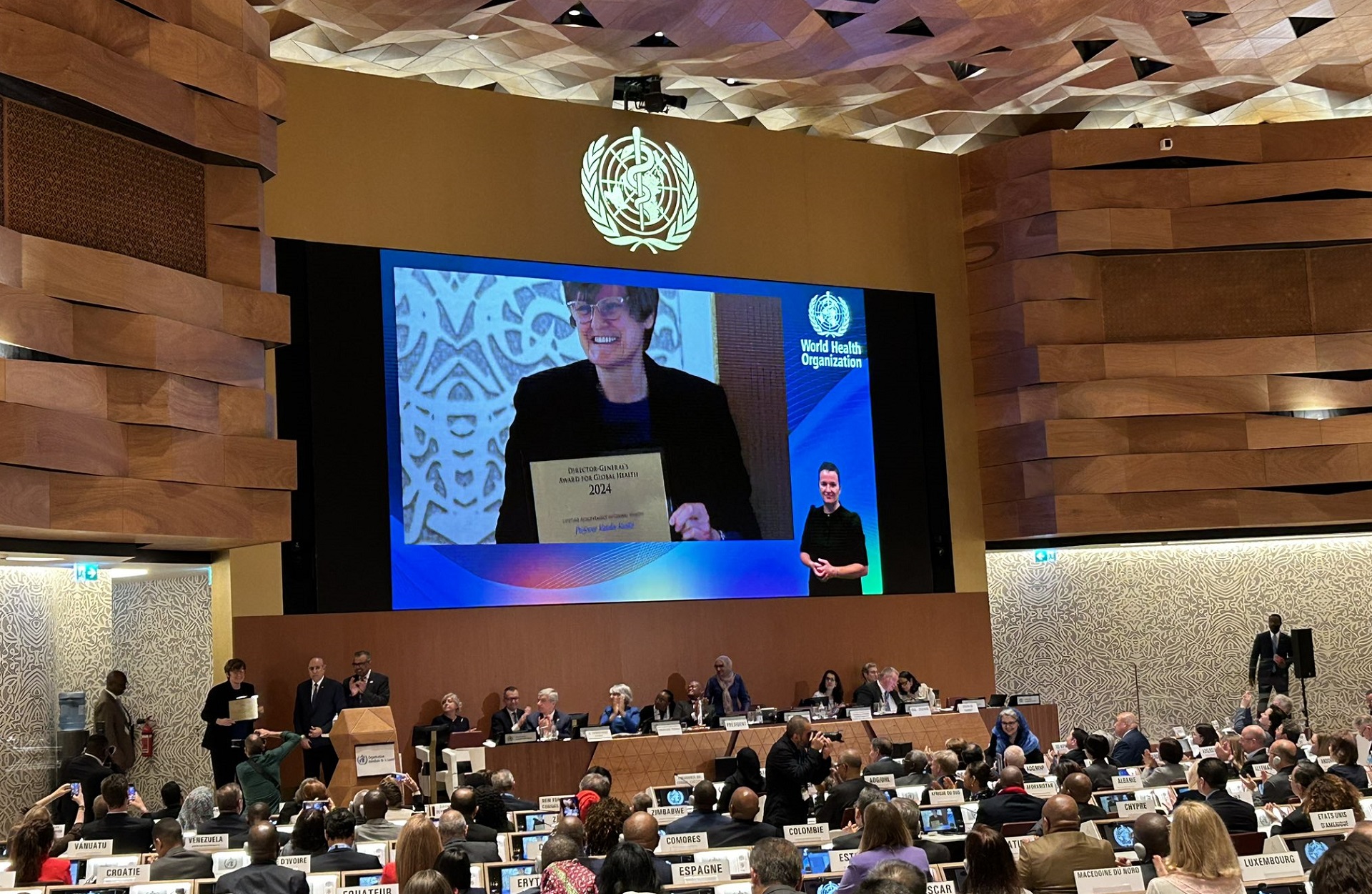
Katalin Karikó and Drew Weissman, i.e. the two Nobel Prize-winning scientists who pioneered the development of mRNA vaccines against COVID-19, and the Prime Minister of Barbados received the “Award for Global Health" founded by the Director-General of the WHO. The award ceremony was held in Geneva on the occasion of a joint event of the World Health Organization and the International Olympic Committee on May 27, 2024. The international award will be placed at the Karikó collection of the University of Szeged.
"All for Health, Health for All!" was the motto of the 77th WHO World Health Assembly that was held in Geneva. The leaders of the International Olympic Committee (IOC) also appeared on the first day of the World Health Organization (WHO) assembly, held between May 27 and June 1, 2024.
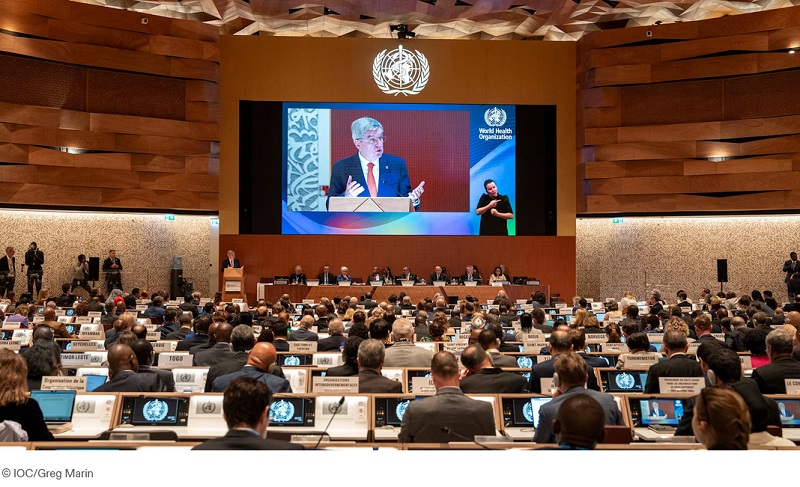
The International Olympic Committee was also invited to the 77th World Health Assembly of the WHO, and the IOC President gave a keynote speech. Photo: IOC/Greg Marin
The Olympic medalist and her Nobel laureate mother
On the olympics.com website, Olympic rowing champion Susan Francia, i.e. Zsuzsanna Francia, and her Nobel laureate mother, Katalin Karikó, spoke about perseverance and mutual support. We came across the special double interview when we were looking for details on the website of the International Olympic Committee about the roles in which Katalin Karikó participated in the joint meeting of the WHO and the IOC in Geneva.
Biochemist Katalin Karikó, awardee of the 2023 Nobel Prize in Medicine, was present at every major competition of her daughter Zsuzsanna Francia, Olympic gold medalist in rowing at both the 2008 Beijing and 2012 London Olympics. The mRNA researcher, along with her husband and sister, cheered enthusiastically for the success of her daughter and her daughter’s US rowing team. "She took pictures and yelled for her daughter as any proud mother would," says the olympics.com summary. Below the article is the video in which mother and daughter talk about perseverance and supporting each other.
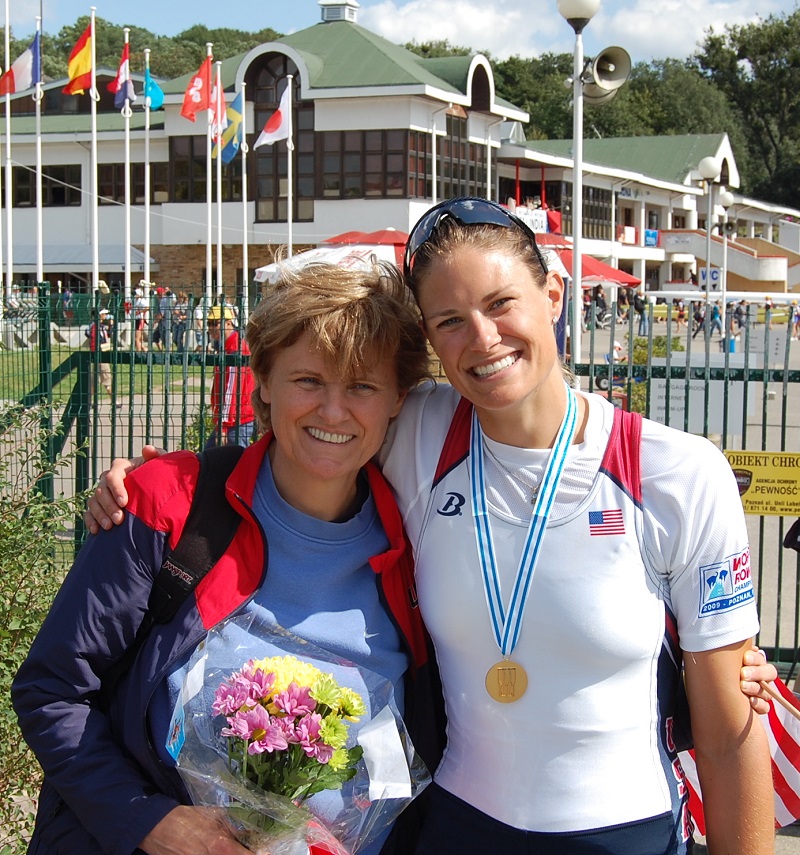
Katalin Karikó was present at every major rowing competition, cheering on her daughter, Zsuzsanna Francia, who was a member of the gold medalist USA women’s eight rowing crew at the 2008 Beijing Olympics and the 2012 London Olympics
Katalin Karikó addressed the likeness between elite sports and being a researcher already in some of her statements and her memoir Breaking Through: My Life in Science. Of course, Katalin Karikó, who also ran a marathon a few years ago, was invited to the joint WHO-IOC event in Geneva not because of this, or because she was the number one supporter of the two-time Olympic and multiple world champion Zsuzsanna Francia. The Nobel Prize-winning scientist, and professor at the University of Szeged, appeared as the guest of honor at the exceptional meeting in Geneva.
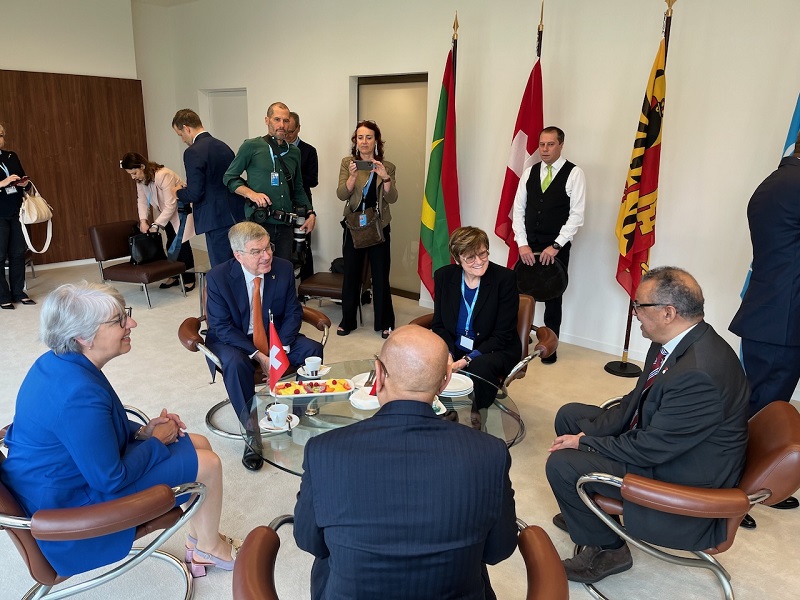
The WHO event in Geneva offered an opportunity for meetings and discussions
"Sport for All!”
Addressing global health challenges is teamwork, said the IOC president. In his keynote speech, Thomas Bach explained: "sport is a low-cost high-impact tool par excellence for public health”. At the World Health Assembly held at the WHO headquarters, the two international organizations announced that they had extended their cooperation agreement signed in May 2020 until the end of December 2025. According to the joint opinion of the IOC and the WHO, sport contributes to the development of a healthy society. This is in line with the Sustainable Development Goal which states that "Good Health and Well-being" are linked. All this contributes to the prevention of non-communicable diseases – emphasizes IOC website news. In his keynote speech, Thomas Bach complemented WHO's call for collective action "All for Health, Health for All!" by adding "Sport for All!”
"The pandemic made it crystal clear how important sport is for our physical and mental health. Sport can save lives," said the IOC president. “Obesity, cardiovascular predispositions, and other non-communicable diseases were the reason for the vast majority of mortality during the pandemic. For all these diseases and predispositions, sport is an excellent tool for prevention. This is precisely what WHO and the IOC addressed through our joint campaigns like ‘Healthy Together’ and ‘Let’s Move’ ” Thomas Bach explained.
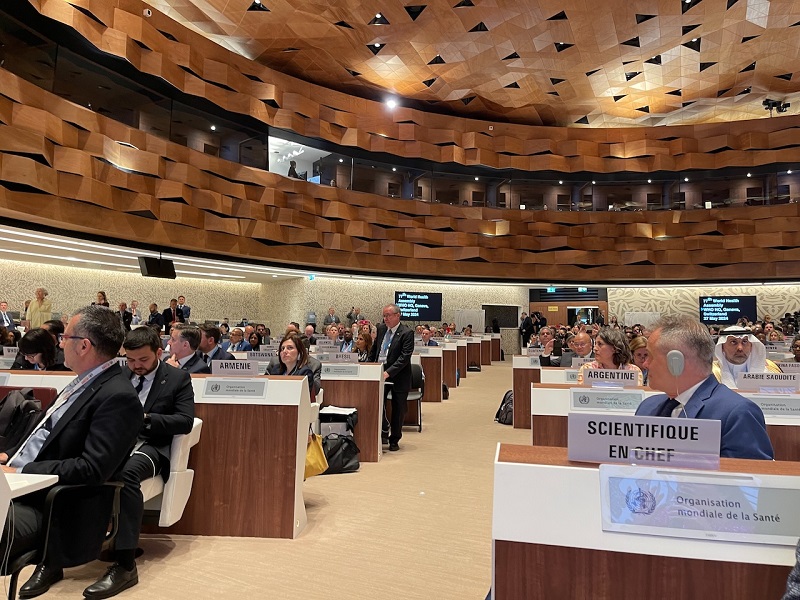
The WHO and the IOC have extended their cooperation until the end of December 2025
“Thanks to the comprehensive countermeasures and vaccination programs that we developed together with WHO, we could make the Tokyo Olympic Games safe for everyone,” the IOC president mentioned as another example of fruitful cooperation. He announced that the "Let's Move" campaign will be relaunched at the peak of Olympic Day on June 23, 2024. With the motto "Let's Move and Celebrate", people around the world are encouraged to "warm up" for this year's Olympic Games in Paris.
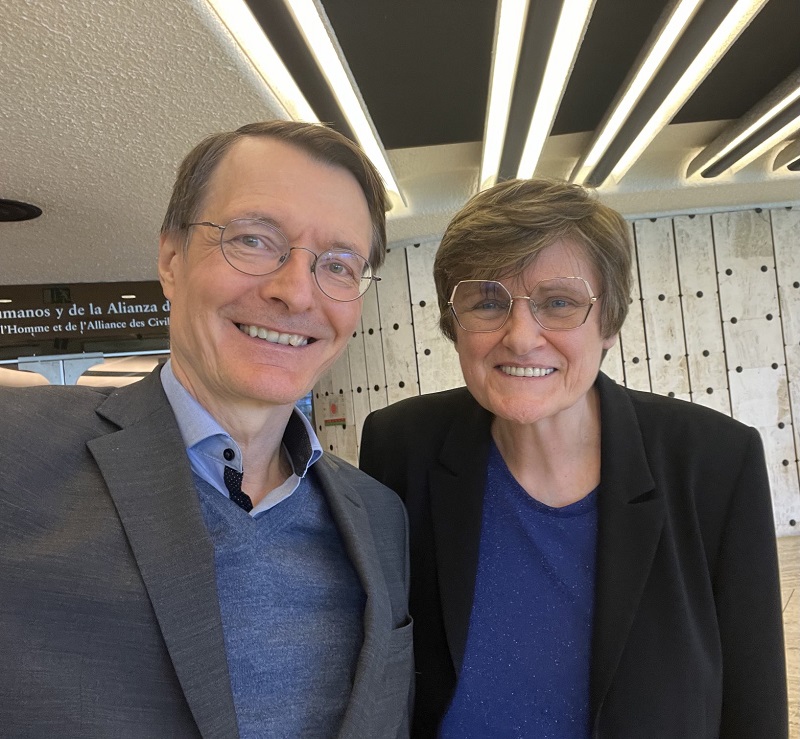
German Minister of Health Karl Lauterbach was also happy to talk and take a selfie with Nobel laureate Katalin Karikó at the WHO assembly in Geneva
Unleashing nature's potential
“…Messenger RNA, more commonly known as mRNA, was not invented by us, it was invented by nature. This is the molecule that carries the information from the DNA to the protein synthesis factory and tells it what to make. This flow of information from DNA through mRNA to the protein synthesis factories takes place in all our body cells," explained Katalin Karikó, who also thanked the WHO award on behalf of her fellow researcher.
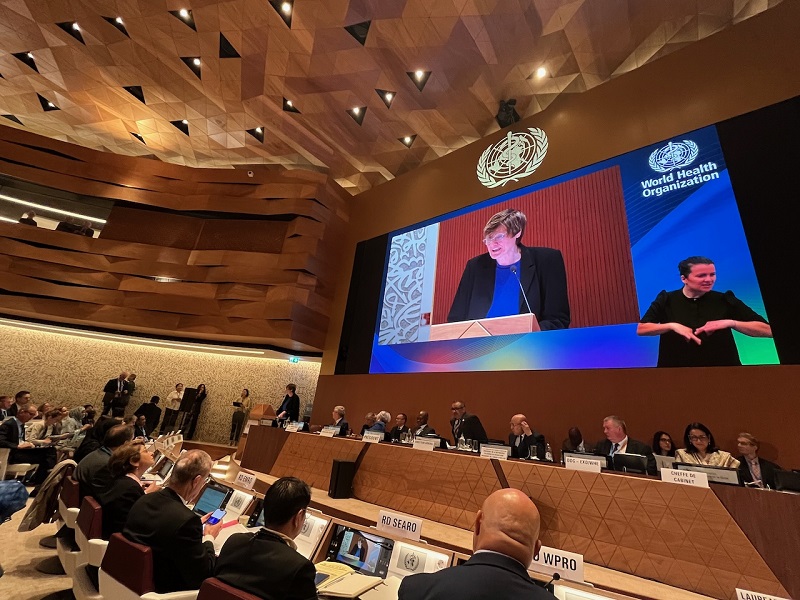
At the 77th World Health Assembly of WHO, held in Geneva, Katalin Karikó also accepted the “Award for Global Health" on behalf of her fellow researcher, Drew Weissman. The Nobel Prize-winning scientist and professor at the University of Szeged took the opportunity to share knowledge on this occasion as well.
“Messenger RNA was discovered in 1961 and it took 60 years to develop it into an approved medical product in the form of the first two COVID-19 mRNA vaccines. What happened during these years?” asked the researcher, and in her answer, she detailed that thanks to the hard work of thousands of scientists, they were able to produce the mRNA encoding the desired proteins in a test tube. The next step was to deliver the mRNA into the cells, where it was converted into proteins. However, the inflammatory response caused by the mRNA has hindered its medical use.
“Drew and I worked tirelessly to resolve this issue. After years of experiments and research, we have successfully identified one of the building blocks of mRNA, which is responsible for triggering the inflammatory reaction. We were able to eliminate this unwanted response and improve mRNA performance by incorporating a new building block. We have unleashed the potential of nature. We achieved this by building on the discoveries of scientists before us and creating the optimal mRNA suitable for therapy," continued Katalin Karikó in her acceptance speech.
"As scientists, our original goals were different. I wanted to develop mRNA for stroke therapy, while Drew Weissman wanted to create the best mRNA-based HIV vaccine. Ultimately, our work, along with the contributions of thousands of other scientists, culminated in the development of vaccines. By the end of 2019, before the pandemic, human clinical trials proved that nanoparticles containing modified mRNA packaged in lipids could be an effective vaccine against the avian flu and Zika viruses. This technology became the basis of the two COVID-19 mRNA vaccines developed by BioNTech-Pfizer and Moderna, and it successfully protected millions of people from the serious effects of COVID-19," concluded the Nobel Prize-winning researcher.
Speaking about the future, Katalin Karikó stated: "The possibilities of mRNA technologies are endless.” Using mRNA, researchers are investigating ways to prevent or treat diseases such as HIV, malaria, tuberculosis, influenza, respiratory syncytial virus, monkeypox, Epstein-Barr virus, Herpes Simplex virus, Nipah virus, Borrelia, shingles, cancer, as well as the treatment of many other acute and genetic diseases.
"WHO plays an important role in the fight against the epidemic, in the coordination of resources, in ensuring plans and preparedness for the prevention and response to the next epidemic, as well as in the processes aimed at improving the health of all of us", stressed Katalin Karikó, and expressed her gratitude to the front-line healthcare workers for their heroic performance. In her acceptance speech, she emphasized that the prize founded by the WHO Director-General is a great and inspiring recognition of the pioneering work of scientists conducting basic research.
Nobel laureate Katalin Karikó addressed the 2024 WHO World Health Assembly, at which all member states of the international health organization are represented, as guest of honor.
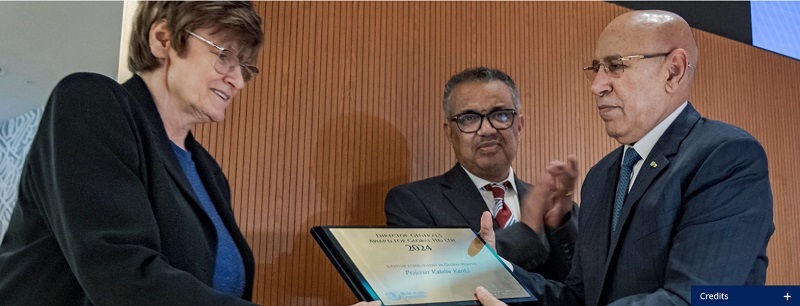
Nobel Laureate Katalin Karikó and WHO Director-General Dr. Tedros Ghebreyesus (center) and African Union President Mohamed Ould Ghazouani (right) at the World Health Organization award ceremony
In 2019, the Director-General of the WHO established the “Award for Global Health”. This award was presented by Dr. Tedros Ghebreyesus, Director-General of the WHO, at the 77th World Health Assembly of the World Health Organization. The three recipients are Katalin Karikó and Drew Weissman, i.e. the two Nobel Prize-winning scientists who pioneered the development of mRNA vaccines against COVID-19, and the Prime Minister of Barbados, Mia Mottley.
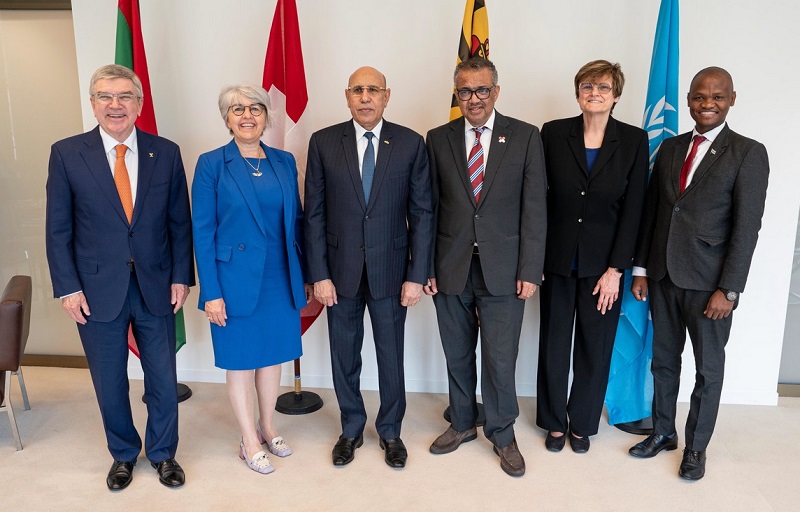
At the 77th WHO General Assembly in Geneva, among others, (from left to right) IOC President Thomas Bach; Elisabeth Baume-Schneider, member of the Swiss Federal Council; Mohamed Ould Ghazouani, President of the African Union; Tedros Adhanom Ghebreyesus, Director-General of the World Health Organization; Katalin Karikó, Nobel Prize-winning researcher, professor at the University of Szeged; and Edwin Dikoloti, Minister of Health of Botswana met. Photo: IOC/Greg Martin
“Professors Karikó and Weissman played a key role in alleviating the burden of COVID-19 and saved lives during the pandemic,” said the Director-General of WHO. “Their leadership in this field has the potential to play a critical role in improving health worldwide.”
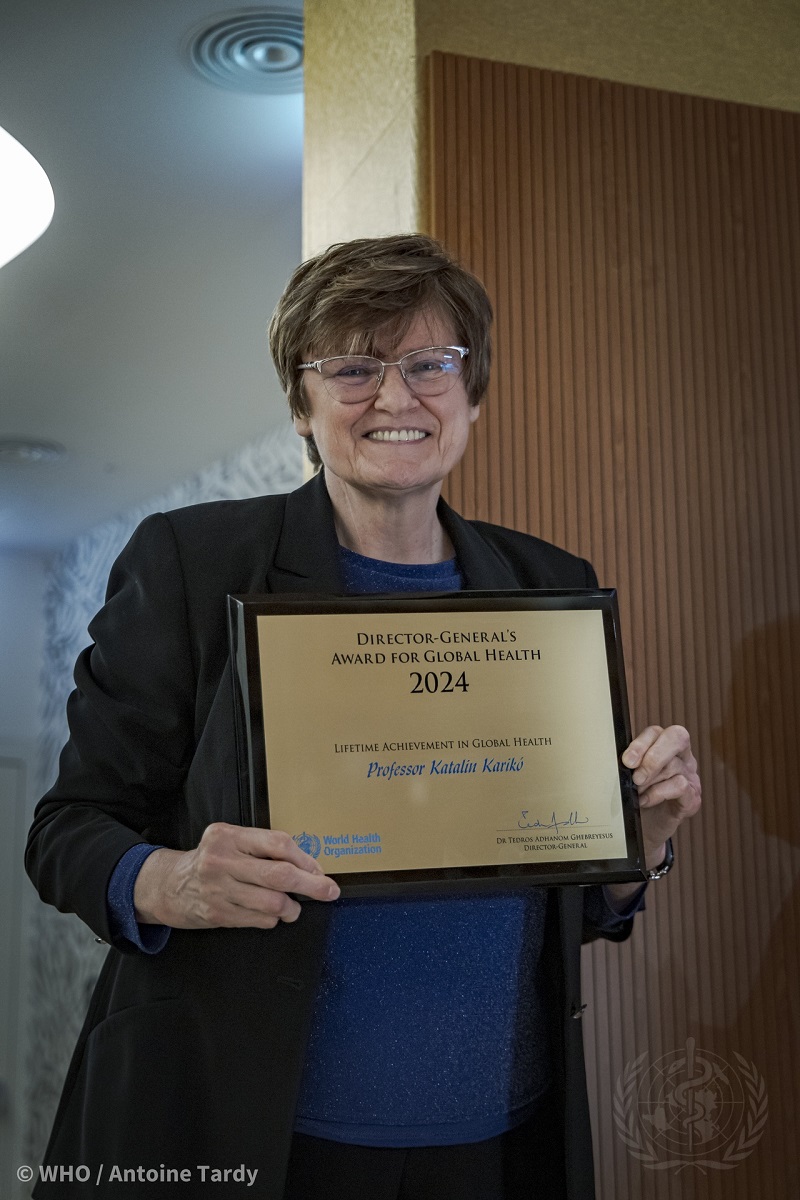
Nobel laureate Katalin Karikó and her latest award
The discovery of the two scientists, who were awarded the Nobel Prize in Physiology or Medicine in 2023, "fundamentally changed our understanding of how mRNA interacts with our immune system", the eulogy refers to the statement of the Nobel Committee.
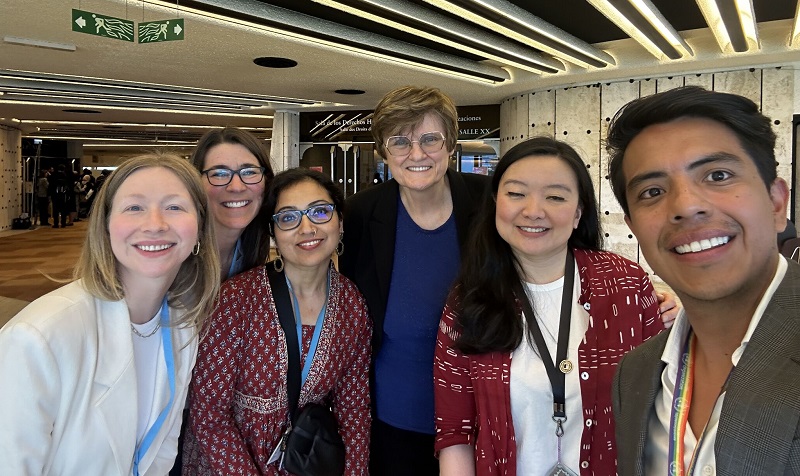
Many photos were taken in the WHO headquarters in Geneva with Katalin Karikó
Professor Karikó is a professor at University of Szeged in Hungary and adjunct professor of neurosurgery at the Perelman School of Medicine, University of Pennsylvania. She is former senior vice president at BioNTech SE, Mainz, Germany, where she worked between 2013-2022. For four decades, her research has been focusing on RNA-mediated mechanisms with the goal of developing in vitro-transcribed mRNA for protein therapy – reads the WHO statement.
Among the results of Professor Drew Weissman, it was highlighted that he is Roberts Family Professor in Vaccine Research and Director of the Penn Institute for RNA Innovation. He is a Professor in the Department of Medicine and Director of Vaccine Research in the Infectious Diseases Division at the Perelman School of Medicine at the University of Pennsylvania.
In 2019, the Director-General of the WHO presented the Global Health Leaders Awards to individuals who have shown exceptional commitment to public health goals. These awards are now given annually to selected individuals or groups who have demonstrated outstanding leadership in achieving measurable health impacts.
Each laureate receives a personalized, engraved plaque and a certificate signed by the Director-General at WHO's most important executive body meeting of the year, the "World Health Assembly". There is no financial reward for this award. The laureates are also personally invited to the event.
The WHO "Director-General's Award for Global Health" recognition addressed to Katalin Karikó – the diploma placed on the marble slab – will soon be on view as the latest attraction of the popular exhibition "Katalin Karikó's Journey to the Nobel Prize and Beyond" at the József Attila Education and Information Center of the University of Szeged.
SZTE Info - Ilona Újszászi
Photos: WHO, IOC, K. K.

